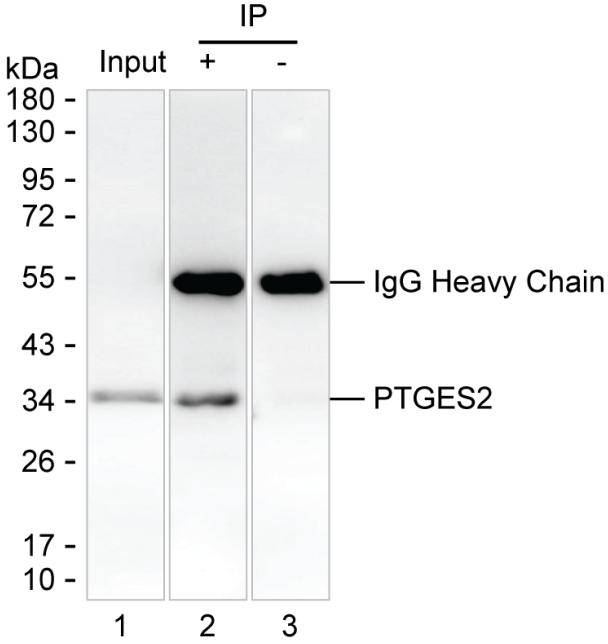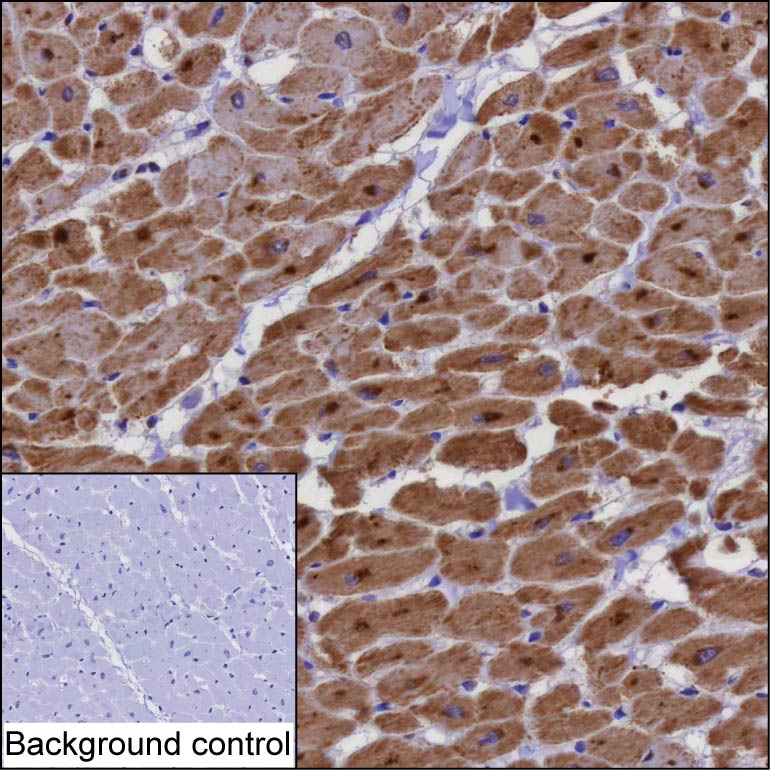

| WB | 咨询技术 | Human,Mouse,Rat |
| IF | 1/100-1/200 | Human,Mouse,Rat |
| IHC | 1/100-1/200 | Human,Mouse,Rat |
| ICC | 技术咨询 | Human,Mouse,Rat |
| FCM | 咨询技术 | Human,Mouse,Rat |
| Elisa | 咨询技术 | Human,Mouse,Rat |
| Host/Isotype | Mouse IgG2a |
| Antibody Type | Primary antibody |
| Storage | Store at 4°C short term. Aliquot and store at -20°C long term. Avoid freeze/thaw cycles. |
| Species Reactivity | Human |
| Immunogen | Purified recombinant fragment of human PTGES2 |
| Formulation | Purified antibody in PBS with 0.05% sodium azide |
+ +
以下是关于PTGES2抗体的3篇参考文献示例(虚构内容,仅供格式参考):
1. **文献名称**: *PTGES2 regulates cellular senescence through prostaglandin E2 signaling*
**作者**: Smith A, et al.
**摘要**: 该研究利用PTGES2特异性抗体,揭示了PTGES2在调控细胞衰老中的作用,发现其通过PGE2合成影响p53通路活性。
2. **文献名称**: *Development and validation of a novel monoclonal antibody against human PTGES2*
**作者**: Li X, et al.
**摘要**: 描述了针对人源PTGES2的单克隆抗体制备与验证,验证了其在免疫组化和Western blot中的高特异性,为疾病诊断提供工具。
3. **文献名称**: *PTGES2 overexpression in colorectal cancer: A biomarker study using immunohistochemistry*
**作者**: Wang Y, et al.
**摘要**: 通过PTGES2抗体进行组织染色,发现PTGES2在结直肠癌中高表达,且与患者预后不良相关,提示其作为潜在治疗靶点。
(注:以上文献为示例,实际引用需查询真实数据库如PubMed、Web of Science等。)
The PTGES2 (Prostaglandin E Synthase 2) antibody is a tool used to study the expression and function of the PTGES2 enzyme, which plays a key role in prostaglandin biosynthesis. PTGES2. a membrane-associated protein, catalyzes the conversion of prostaglandin H2 (PGH2) to prostaglandin E2 (PGE2), a lipid mediator involved in inflammation, pain response, fever, and cellular homeostasis. Unlike other prostaglandin synthases, PTGES2 exhibits unique regulatory mechanisms and subcellular localization, primarily in the endoplasmic reticulum and nuclear membrane. Its expression is modulated by various stimuli, including cytokines and stress signals, linking it to pathological conditions such as cancer, neurodegenerative diseases, and chronic inflammation.
PTGES2 antibodies are critical for detecting protein levels in tissues or cell lysates via techniques like Western blotting, immunohistochemistry, or ELISA. Researchers use these antibodies to explore PTGES2's role in disease pathways, drug responses, or interactions with other signaling molecules. Structural studies also employ PTGES2 antibodies to map functional domains or post-translational modifications. Specificity validation (e.g., knockout controls) is essential due to homology with other prostaglandin synthases. Overall, PTGES2 antibodies serve as vital reagents in understanding the enzyme's contribution to both physiological processes and disease progression.
×